An e-commerce SEO audit checklist serves as your map to success in e-commerce. Such shapes your online presence and competitiveness, helping you reach the right audience. Moreover, prioritizing SEO is essential in today’s digital geography, as over 70% of consumers make online purchases. Accordingly, many e-commerce businesses need help to stand out in a crowded market, leading to missed opportunities for sales.
However, implementing an effective e-commerce SEO strategy can enhance your visibility and attract the right customers to your online store. Similarly, staying updated on trends and techniques is necessary for boosting customer engagement and driving traffic. With this knowledge, businesses can stay ahead of competitors who adapt more quickly.
SEO audits examine the elements that search engines prioritize, leading to increased visibility and engagement. Over and above that, to support your success, we have compiled an e-commerce SEO audit checklist highlighting its significance in elevating your business.
What Is eCommerce SEO?
eCommerce SEO refers to optimizing an online store to rank higher in search engine result pages (SERPs). While traditional SEO tactics typically focus on driving organic traffic to your site, eCommerce SEO aims to turn visitors into customers. Many store owners worry about high traffic but low conversion rates. Although they have great products, they need better optimization to convert visitors. Thus, focusing on user intent and optimizing for conversions can significantly improve your sales.
Additionally, approaches and practices to optimize websites effectively include increasing loading speeds and mobile friendliness. These aspects must be addressed to avoid frustrated customers and lost sales. Remember, consider what the user wants before optimizing for search.
How does this work? SEO audits involve the critical elements that search engines prioritize, leading to increased visibility and, ultimately, higher engagement. So, to support your success in the online marketplace, we have compiled an e-commerce SEO audit checklist that details its significance and importance, which can help you raise your business to new heights.
What is meant by an E-commerce SEO Audit?
An e-commerce audit examines a business website for errors and SEO performance. It analyzes detailed search engine optimization factors and prepares the website for more traffic. Since e-commerce websites have many products and pages, a thorough e-commerce website audit will be used to fix this. Also, after analyzing the current SEO on the e-commerce site, the results show how well the checklist must be used to get organic traffic and location globally.
An e-commerce SEO site audit examines every element of your online store to help determine why it has yet to attract organic traffic. Businesses often need more insight into their SEO performance and potential issues. However, regular audits uncover hidden problems and provide actionable insights to enhance your site’s performance.
Once you have identified all the issues plaguing your online store, employ effective eCommerce SEO audit services to increase its rank and draw more organic traffic. Moreover, it requires various mini-audits spanning technical, content, and off-page aspects. Furthermore, it focuses on
-
Site navigation
-
URL structure
-
User experience
-
Load time
-
Security (including SSL certificates).
Importance of SEO Audit for E-commerce
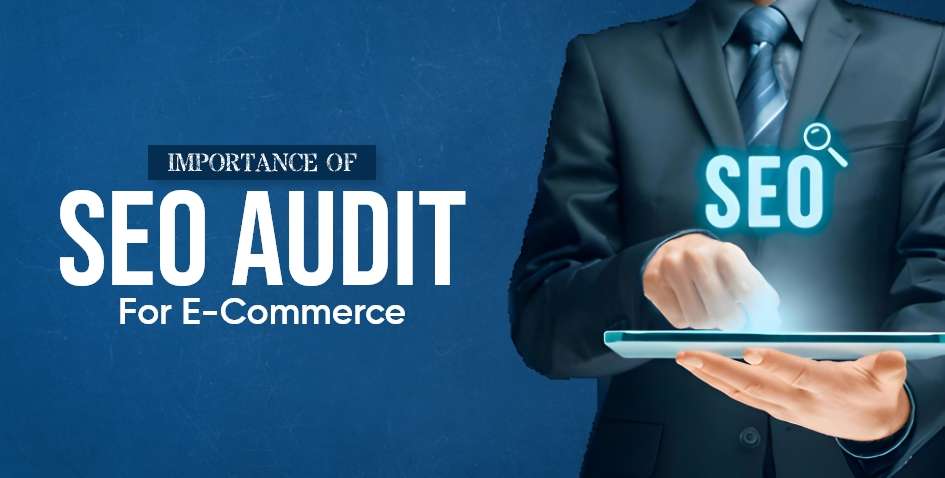
Adding new product pages and revising existing ones is essential, as fresh and optimized content allows us to target a broader audience. A SWOT analysis through the SEO audit helps identify the website’s strengths, weaknesses, opportunities, and threats.
Revising the marketing funnel and clarifying the website’s intent can capture users’ attention and enhance overall optimization. An audited and optimized e-commerce site effectively converts visitors into potential buyers.
Why Is SEO Necessary for eCommerce Websites?
As someone new to SEO, you must understand its significance for e-commerce websites. Indeed, SEO plays an essential role in ensuring the presence of your online store. Therefore, many businesses must be more visible online, leading to missed sales opportunities.
What SEO achieves includes:
- Increased Visibility: SEO increases visibility by ranking higher in search engine results, making your products/services more likely to be discovered by potential buyers.
- Targeted Traffic: Best SEO practices for eCommerce websites attract those actively searching for what you offer, increasing conversion chances.
- Affordable Marketing: SEO’s organic traffic generation method is more sustainable and cost-effective in the long run than paid ads.
- Competitive Advantage: With more consumers starting their buying journey online, a well-optimized website can give your company an advantage over competitors who neglect SEO.
- User Experience Enhancement: SEO goes beyond pleasing search engines; it also involves making websites user-friendly. This results in more satisfied clients and recurring business.
- Long-Term Growth: SEO contributes to your online business’s long-term development and sustainability, driving its long-term expansion and success.
2025 eCommerce SEO 7 Best Practices
Below are recommended practices and tactics for creating an effective eCommerce SEO guide strategy in 2025 to reach a wider audience and generate more sales.
Practice1. Keyword Research for eCommerce SEO
Researching relevant keywords is integral to optimizing an eCommerce website. In particular, keyword research involves looking for keywords and phrases your customers use when searching for products you sell online.
Remember how we said earlier that everything is about user intent? Hence, you must search for keywords depending on the purpose of those seeking them. For example, as an online store owner, you’re after people at the bottom of your sales funnel with commercial intentions.
Unfortunately, many store owners encounter challenges finding keywords that attract their target audience. Therefore, you can use AI tools like ChatGPT and keyword research platforms like Ahrefs and SEMrush to streamline the keyword discovery process.
Here are a few strategies for conducting effective keyword research for your SEO eCommerce strategy:
- Understanding Your Audience: Understanding your target audience’s search behavior is paramount when browsing products online. Moreover, consider their requirements, preferences, and language used when shopping. Google Keyword Planner and SEMrush provide invaluable insights on relevant terms within your industry.
- Long-Tail Keywords: These are more precise, longer-tail keywords with lower competition that typically have more excellent conversion rates. Instead of targeting “shoes,” try “women’s running shoes for flat feet.”
- Analyzing Your Competitors: Examining which keywords your competitors rank for can give valuable insight into market trends and help identify potential keyword prospects for your Site.
- Integrating Keywords Into Content: Once keywords have been selected, incorporate them naturally and improve user experience by including them in product titles, descriptions, blog postings, and meta tags. Make sure that the usage is natural and enhances the user experience.
- Seasonal Trends: Be aware of seasonal trends and adapt your keyword strategy accordingly. For instance, targeting “Christmas gifts for dad” when the holiday season nears would be an effective strategy.
- Local Keywords: If your eCommerce shop services specific locations, add local keywords into its strategy plan.
Practice 2. Do Not Overstuff Pages with Keywords
Keywords are essential, but overuse can damage your rankings. Many of you accidentally damage your SEO by keyword stuffing, which results in less visibility. To address this, you must focus on natural keyword integration, using synonyms and related phrases to enhance readability and improve user experience.
To avoid this:
- Natural Keyword Integration: Ensure keywords are integrated naturally into the content. Keywords should enhance readability and quality rather than detract from it.
- Synonyms and Related Phrases: Use synonyms and similar phrases to minimize duplication and extend your reach in search engine results.
- User-Centric Content: Always aim to write with the reader in mind when creating content, answering user queries, and adding value, which will outperform content that has only been optimized for search engines.
- Avoid Over-Optimization: Be wary of over-optimizing your content. If a page reads awkwardly or feels forced, it has likely been over-optimized.
Practice 3. eCommerce Page Structure for Better Ranking
A well-structured website is critical for user experience and SEO. Poor site structure can lead to high bounce rates and lost sales. Therefore, creating a clear site structure with descriptive URLs and breadcrumb navigation to improve usability.
Besides, search engines find it easier to crawl websites with an easily navigable structure. In contrast, users find what they need more quickly if your eCommerce store features clear hierarchies and accurate menus.
Here are a few suggestions for improving the structure of your website:
- Structure your Site Properly: Create a clear site structure that groups items and categories logically for improved user navigation and enables search engines to index it more effectively.
- Descriptive and Clean URLs: For optimal performance, create short and descriptive URLs and include relevant keywords, such as “/women-running-shoes” instead of “/product12345” when setting up links.
- Breadcrumb Navigation: Use breadcrumb navigation to enhance user experience and fortify your website’s structure for search engines.
- Mobile Optimization: As mobile searches increase, make sure your website is mobile-friendly. Google’s ranking algorithm considers this factor.
Practice 4. e-Commerce Website On-Page SEO
On-page SEO optimizes individual web pages to rank higher in search engines. Many eCommerce sites neglect on-page elements, which leads to missed SEO opportunities. To enhance visibility, we recommend that you maximize product descriptions, titles, images, and internal links.
Here are tips to boost on-page SEO:
- Product Descriptions and Titles: Write eye-catching product descriptions and titles using primary keywords without overusing them. Avoid keyword stuffing!
- Image Optimization: When optimizing images for search, choose high-quality photos with descriptive file names and ALT tags containing relevant keywords.
- User Reviews and Ratings: Involve users in providing reviews and ratings that create unique content while building credibility, which can boost SEO efforts.
- Internal Linking: Internal links should be utilized strategically to assist search engines in discovering new pages on your Site and spread page authority throughout.
Practice 5. Technical SEO for E-commerce Websites
Optimizing an eCommerce website’s technical SEO ensures search engine crawlers can access and understand it. For example, slow-loading or poorly designed websites frustrate users and lead to lost sales. To close the leads, you must improve site speed, ensure mobile responsiveness, and secure your site with HTTPS.
You can boost technical SEO by:
- Site Speed: Improving your site’s loading speed is essential for SEO and user experience. Image optimization, CSS and JavaScript minification, and a content delivery network (CDN) are all techniques that can be used to improve loading speed.
- Responsive Design: Ensure your Site offers an enjoyable user experience on all devices – particularly smartphones and tablets.
- Secure Website (HTTPS): For optimal website security, consider employing HTTPS encryption when handling sensitive client data.
- Crawl issues: To ensure all pages are indexed appropriately, regularly inspect Google Search Console for crawl errors and correct them as soon as they occur. In this way, you provide all critical pages will be indexed.
Practice 6. Content Marketing for eCommerce SEO
Content marketing boosts eCommerce SEO by engaging customers. Specifically, with quality content, eCommerce sites can rank and attract visitors. Thus, regularly producing informative blog posts, buying guides, and engaging video content is essential to attract customers.
Why? Because search engines learn about your website’s products through content, showing your eCommerce store to consumers who search for terms that appear on your website. Consequently, content marketing involves distributing your content in many formats and across several platforms.
You can produce the following types of content:
- Blog Posts: Write blog posts regularly about your products and industry to educate customers and insert keywords and internal links. Doing this allows customers to stay up-to-date and gives you another opportunity to add SEO keywords into each post for additional search engine ranking opportunities.
- Buying Guides and How-to Articles: Include buying guidelines, how-to articles, product tips, and any other educational content relevant to your niche on your website as an invaluable knowledge resource for visitors in that field. This will further strengthen its position as a knowledge resource in its niche market.
- Video Content: Add video content, reviews, or behind-the-scenes footage to your Site for greater engagement and browsing time, as well as search engine signals.
Practice 7. Link Building for eCommerce SEO
Link building is vital for boosting your site’s authority. Many businesses need help obtaining quality backlinks, but are fine. To enhance your site’s credibility, you must focus on high-quality link-building strategies, such as guest posting and influencer partnerships.
Here are pointers for link building:
- Prioritize Quality Over Quantity: Prioritize building high-quality links from credible websites within your niche rather than massing multiple low-grade ones together. One high-quality link is more valuable than multiple low-quality ones.
- Guest Posting: Writing and publishing content on other credible blogs or websites is known as guest posting, which generates backlinks for your website and exposes it to a greater audience.
- Partnerships with influencers: Join influencers to produce content that naturally refers to your products or website.
- Build Broken Links: Locate broken links on relevant websites and provide your material as replacements.
- Local SEO tactics: When applicable, use local SEO tactics, such as business listings and community involvement, to build local backlinks.
4 Steps: E-commerce SEO Audit Checklist in 2025
We are here with the e-commerce SEO audit checklist to help you maximize your visibility and boost your sales on digital platforms. This SEO checklist includes:
1. On-page SEO Audit

An on-page SEO audit includes all the activities you perform on your website. Specifically, it means optimizing every business page using unique content and the right keywords to generate sufficient leads.
Moreover, this helps you analyze your website’s health and performance on search engines compared to your competitors. Consequently, the page contains many factors to help you perform the best e-commerce SEO audit. By implementing our on-page SEO guidelines, you can increase your website’s search rankings. These include:
-
Evaluate Your Keyword Usage
First and foremost, keywords and search engine algorithms are directly linked. If you want your carts to be loaded every time, then using the right keyword at the right place is significant. For example, keyword placement at the start of the content, tags, and meta descriptions can significantly enhance visibility.
The keyword placement at the start of the content, tags, and meta description can take your shoe off. Furthermore, Google’s search console can help you quickly analyze your search results. Here are some places where auditing is critical to get a better rank:
- Analyze Current Rankings: Google Analytics allows you to measure the current rankings of your keywords. This allows you to rank your content and make your website more visible.
- Find and Incorporate Relevant Keywords: High-volume keywords can work for your e-commerce store SEO audit. In particular, the right keyword strategy can drive notable traffic and conversions by targeting your related audience.
- Analyze Competitor’s Rankings: Monitoring competitors’ rankings helps you analyze your performance. You can stand out by comparing keywords and effectively using highly searched terms.
- Focus on Search Intent: Consumers visit the website from different perspectives: they only want information about the product or want to buy. Thus, how you present your product and its information is crucial. Notably, Google categorizes search intent, which can guide your optimization efforts.
- Measure Keyword Difficulty: Understanding keyword difficulty shows the competition level for specific keywords. Therefore, by conducting SEO audits for e-commerce sites, you can replace high-difficulty keywords with those that are easier to rank for, allowing you to generate leads without overspending.
- Keywords search volume: You can use Google Keyword Planner to identify keyword search volume. Such helps you understand your competitors’ visibility and allows you to focus on keywords with less competition and more volume.
- Examine URLs: Using keywords in your website URL simplifies Google crawling. However, be careful because excessive keyword stuffing can lead to penalties.
-
Optimize Your Title Tags and Meta Description
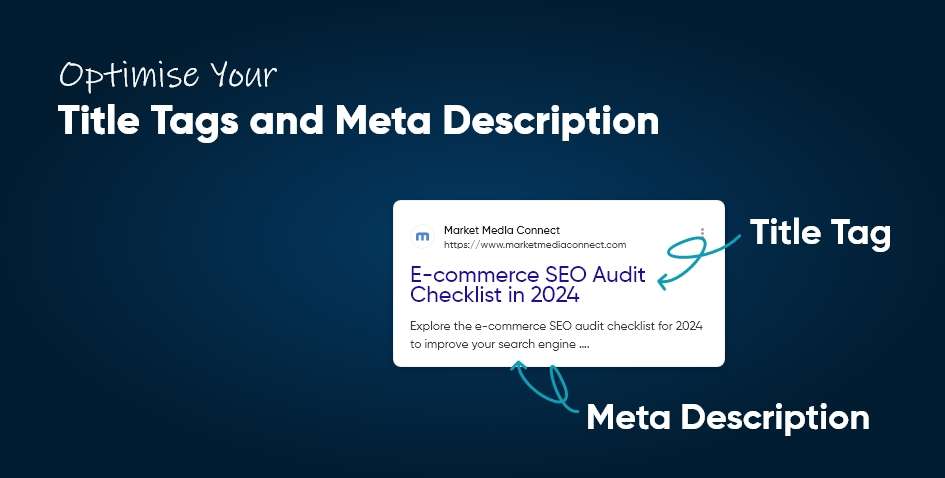
Furthermore, people on social media and search engines categorize their posts using title tags to locate content. Thus, strategic use of primary keywords in the title tag of pages is essential for improving search engine optimization. Ideally, your meta description should be 160 characters, while your meta title should be between 50 and 70. This is a crucial factor to revise during an online SEO audit of your business website.
- Analyze high and low CTR
- Evaluate on-page content strategy
- Focus on content gaps
2. Off-page SEO Audit
Next, finding some business websites on search engines can be challenging due to constantly changing Google algorithms. Consequently, businesses must build more website links to maintain a high ranking. Off-page SEO audits are essential for all e-commerce businesses because links from other sites back to yours are increasingly critical. The auditing factors include:
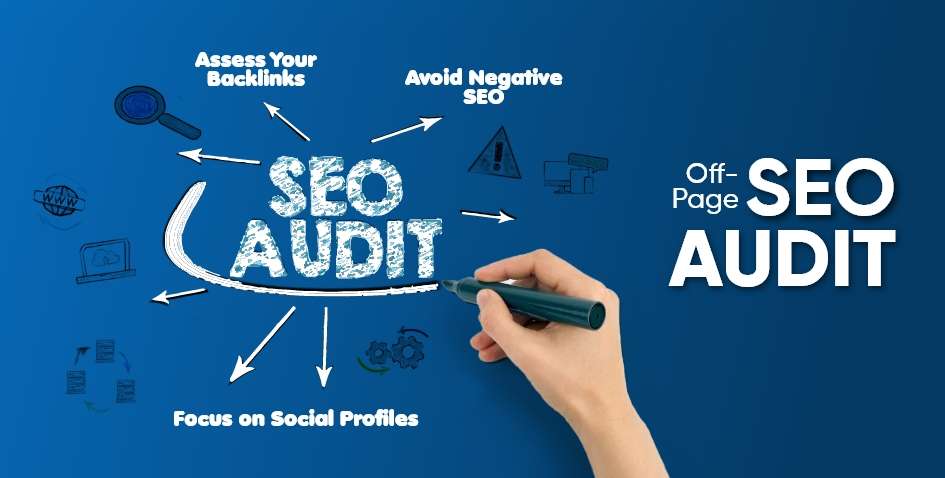
For instance, if you generate traffic from harmful websites through backlinks, you risk losing organic traffic. Therefore, it is crucial to remove toxic sources and utilize reputable external links.
Creating several backlinks with high domain authority and a lower spam score can enhance your business’s authority and rankings. Thus, focus on authentic links connected to your website, as broken links can deter customers.
Moreover, social media can create a continuous flow of traffic. A social profile SEO audit is crucial because fresh, attractive content shared through internal and external linking increases your reach. As a result, your presence grows, enhancing visibility on search engines and building trust.
3. Technical SEO Audit
The technical SEO audits check a website’s mobility and identify technical factors to ensure smooth navigation. Specifically, technical SEO involves modifying your website’s source code and HTML to boost your ranking in e-commerce. Because of the numerous product and service pages, Google may struggle to crawl them, making technical SEO vital for e-commerce success.
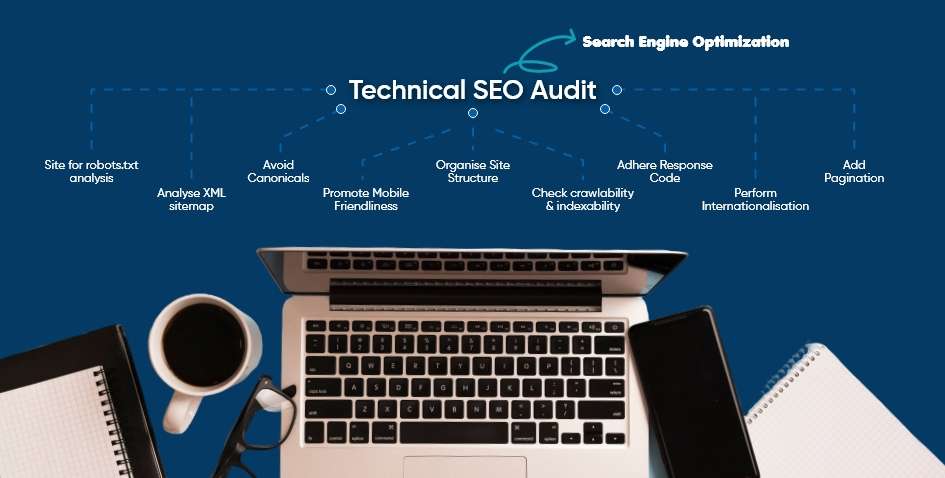
-
Site for robots.txt analysis
The robots and text help you understand the search engine for your business website. They give crawling and non-crawling instructions to Google to prevent your website from loading, such as non-crawling instructions on shopping carts.
At the same time, an XML sitemap categorizes your website’s pages to make it easy for Google to crawl them. With the help of XML, Google finds it easy to understand and crawl your essential pages. Moreover, it rebuilds your pages if they are deleted from your website.
As canonical means to create duplicate URLs of your website, many e-commerce sites use these links to bring customers to their website from different platforms, but it has a dark side, too. It makes it difficult for Google to identify the URL of the website, and sometimes, it flags it as duplicate. It is a side of black hat SEO, which should be avoided. Ad plugins can help fix this issue on your commerce site.
-
Promote Mobile Friendliness
According to our research, more than 90% of users prefer mobile phones to navigate digital platforms. So, do they expect the e-commerce website to load faster in a few seconds? While conducting an e-commerce SEO audit service, you must check the loading time of different pages on multiple browsers, image optimizations, popups, test forms, and the website’s speed tests and signal structure for easy and long-lasting relations with visitors.
Site structure is an integral part of auditing because when website pages are linked together, consumers are shifted from one product page to another, which leads to more purchases and revenue. E-commerce sites need to get consumers to stick with your store.
-
Check crawlability and indexability
Indexability and crawlability are must checks in SEO audits because they easily handle search bots and make the directions and chance to appear on search engines. You can build sitemaps, authentic link-building strategies, and amendments in the robot.txt files, which are balanced factors. Tools like Screaming Frog and SEMrush help identify the website’s health, indexing, and crawling issues.
It means a response of return on your website. If the response code is high, your SEO audit for your e-commerce site will be excellent and visible on search engines. You can link and unlink your pages anytime if your links need to be more relevant to your product or service. With the help of SEO auditing, you can check the website for any issues while setting up the correct URLs and redirections for more responses.
-
Perform Internationalization
E-commerce sites operate in different countries and languages, making it difficult for Google to identify the URLs. An SEO audit is compulsory for this internalization because it eases the complexity of using the hreflang tag. What is the Hreflang tag? It is an HTML attribute that separates the language and location. As a result, it makes it easy for Google to crawl the audience geographically.
It means linking the website’s product and service pages or dividing them into parts such as 1, 2, 3, or following, previous. This aspect of technical SEO audit is essential for an eCommerce site to succeed because it alarms the consumer to shift to the next page and makes them satisfied scrolling your website. Moreover, it makes it easy for Google to crawl and analyze the website.
4. Content Audit
After performing on-page, off-page, and technical SEO audits, it’s time to evaluate your website’s content. When launching SEO content for your eCommerce site, focus on the following factors.
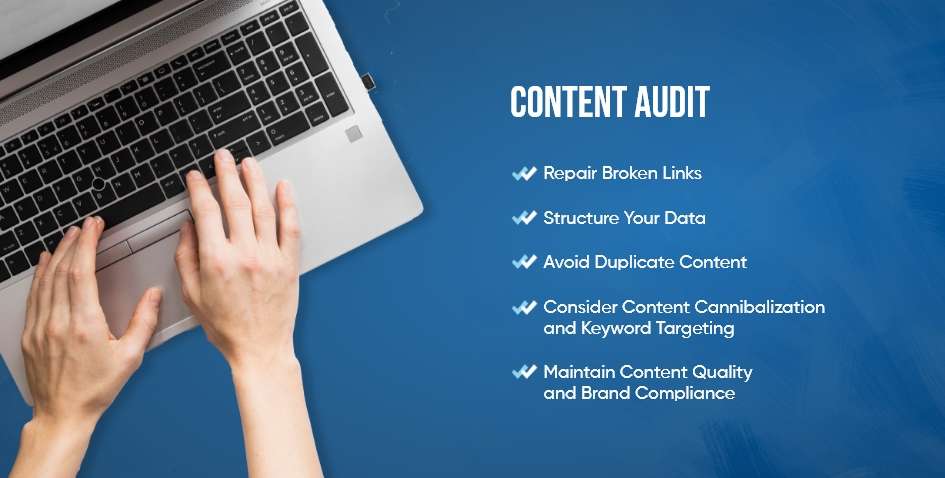
Not attaching internal and external links can be beneficial for your eCommerce business. However, continuing SEO auditing can fix this by identifying whether the links pointing to the product or service keep a consumer on that page. If not, the customer will leave immediately because of a bad user experience.
Additionally, well-structured data can do wonders for your eCommerce site because Google quickly understands your content pages and generates high search engine result pages for your product and service.
What’s more? You can achieve this by adding schema markup code to your website page to help search engines understand your content and product on SERPs. The product and breadcrumb can work effectively as they are relevant details and the right individuals for your eCommerce site.
Moreover, most e-commerce site owners copy content from other websites through product descriptions and instructions, which flags duplicate content during SEO auditing. You can create unique content, guides, and review stories to make you stand out by resonating with your audience and providing something more than your competitors.
-
Consider Content Cannibalization and Keyword Targeting
In this advanced time, many e-commerce businesses are running on different levels. Many e-commerce businesses offer the same products and services, but an SEO audit will work here. How? Using long-tail keywords in your content can help you compete with your competitors by cutting tedious, similar keyword searches.
-
Maintain Content Quality and Brand Compliance
Lastly, adding random content to your website will do everything. You can create valuable, helpful content for the customer, as it will convert your lead and build credibility on Google. How? You can create topic clusters, and by covering those topics in your niches, you can make the technical authority of your business.
Conclusion
SEO is essential for improving your website’s ranking in today’s competitive digital environment. Therefore, regularly monitoring your site and conducting on-page, technical, and content audits are crucial for eCommerce success.
To support your efforts, we have created a complete eCommerce SEO Audit Guide for 2025 to maximize your profits. If you find managing your SEO overwhelming, Market Media Connect offers a full digital audit for e-commerce and SEO services to ease your burden.
Ultimately, focus on the discussed areas and remember that eCommerce SEO requires ongoing adjustments to keep pace with evolving algorithms and user behavior. For expert help, do not hesitate to contact our SEO specialists.
Frequently asked questions for eCommerce SEO Audit Guide
How to measure SEO ranking?
You can measure SEO ranking in the following ways:
- Returning visitors
- Keyword ranking
- Bounce rate
- Domain and page authority
- Click-through rate (CTR)
- Time spent
- Organic traffic
Is an e-commerce SEO audit required for small online stores?
Yes, audits are critical for all sizes of e-commerce firms looking to enhance their online presence and performance.
When to Conduct an SEO Audit?
An SEO audit should be performed once a year to verify that your website is in line with the most recent search engine algorithms.
There may be specific instances that call for immediate auditing. A significant redesign, a new product launch, or updates in your e-commerce platform might prompt one that necessitates an immediate check.
What is needed for an SEO Audit?
You need different tools to help analyze and fix the website’s performance. Some of the best tools used in auditing are:
- Google Analytics
- Screaming frog
- Ahrefs
- Google search console
- SEMrush
What issues typically emerge during an eCommerce SEO Audit?
Common issues include improper keyword optimization, slow site performance, poor link profiles, and low-quality content. Addressing these issues is crucial for improving your website’s SEO performance.